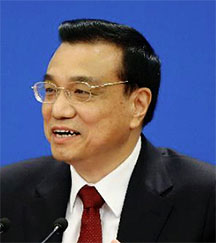BRASILIA, (Reuters) – Chinese Premier Li Keqiang came to the rescue of Brazil’s slumping economy yesterday with trade, finance and investment deals worth tens of billions of dollars in energy, mining, aviation and the upgrade of dilapidated infrastructure.

On his first official trip to Latin America, Li saw a raft of agreements signed, ranging from a $1 billion purchase of passenger jets made by Brazil’s Embraer to the lifting of an import ban on Brazilian beef and a long-discussed plan to build a railroad over the Andes to the Pacific. President Dilma Rousseff said the deals totaled $53 billion. The injection of capital from China could not come at a better time for Brazil, which is sliding into recession following the end of a commodity boom last decade that was fueled by voracious Chinese demand for its main exports, iron ore and soybeans. As China’s economy slows, Chinese companies are looking abroad for new opportunities to invest and Chinese banks have begun to provide abundant financing.
Li said Chinese construction and steel companies were ready to help Brazil overhaul its infrastructure to reduce transport costs for the export of Brazilian commodities.
The two leaders announced that the Industrial and Commercial Bank of China Ltd, the world’s largest bank by assets, will set up a $50 billion fund with Caixa Economica Federal, Brazil’s largest mortgage lender, to invest in infrastructure projects in the South American country.
The fund was another sign of China flexing its financial might in Latin America, a region that used to be dominated by the United States but where China lent more than the World Bank and the Inter-American Development Bank combined last year.
Brazil’s state-led oil company Petroleo Brasileiro SA signed two finance agreements worth $7 billion with Chinese state banks, a $5 billion credit accord with the China Development Bank and a $2 billion credit line with China’s Import-Export Bank.
The funds come at a time of big challenges for Petrobras. A plunge in oil prices, years of high spending, project delays and a huge corruption scandal have squeezed its ability to generate cash and made financing new projects more expensive.
Li and Rousseff watched by video connection the start of construction of a 2,800-kilometer transmission line by China’s State Grid Corp, the world’s largest utility. It will supply power from Belo Monte hydroelectric dam under construction in the Amazon to the energy-hungry industrial state of Sao Paulo.
The two countries agreed to start feasibility studies on a railroad that will cross the Andes and link Brazil’s Atlantic coast to Pacific ports in Peru, allowing Brazilian exports to China to avoid the Panama Canal.
Tianjin Airlines confirmed a previously announced purchase of a first batch of 22 E-190 passenger jets made by Embraer of 60 planes China pledged to buy when President Xi Jinping visited in 2014. The Bank of Communications Co Ltd, China’s fifth-biggest lender, said it bought 80 percent of Brazilian lender Banco BBM SA for about $174 million, the Chinese bank’s first overseas acquisition. China also ended an embargo on Brazilian beef imports that had been in place since 2012 due to a mad cow scare. Eight Brazilian meat processing plants were approved to ship to China, and nine more would get the green light when Brazilian Agriculture Minister Katia Abreu visits China in June. Brazilian miner Vale said it sold four large iron ore carriers to China Merchants Energy Shipping Co, as it looks to raise cash in the middle of an iron ore price slump. ($1 = 3.0228 Brazilian reais)









